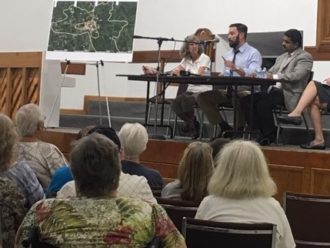Brenda Goodman is a senior news writer for WebMD. Andy Miller is editor and CEO of Georgia Health News.
More than 150 Covington-area residents turned out for a community meeting Thursday to discuss toxic pollution coming from a local medical device sterilizing plant.
Speakers and audience members called for independent testing of a sterilizing gas, ethylene oxide, being released from the BD plant.
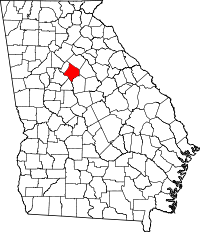
“If we don’t stand up and demand it, it’s not going to happen,’’ Michael Geoffroy, a local attorney, told the crowd gathered in the gym of the Calvary Baptist Church. “I think we need as much testing as we can, and not just at one or two points, but throughout the community.’’
Geoffroy was flanked by two enlarged maps showing rings around the sterilizing facility, known locally as “Bard’’ after the company’s former name. The maps showed state projections of cancer risks in the area surrounding the plant.
It’s one of two areas in Georgia that EPA data flagged as potentially having higher cancer risks due to toxic air pollution. Most of the risk in these areas comes from one chemical, ethylene oxide. Both areas are near facilities that use the gas to sterilize medical equipment.
In 2016, the EPA completed a review of the chemical’s safety and declared the gas a human carcinogen.
Among 109 census tracts flagged as at elevated cancer risk in the United States, three are in Georgia. One of those is in Covington, the Newton County seat. The other two are in the Smyrna area, where Sterigenics, another sterilizing company, has a facility.
The city of Smyrna this week committed to independent testing of the air surrounding the Sterigenics plant.
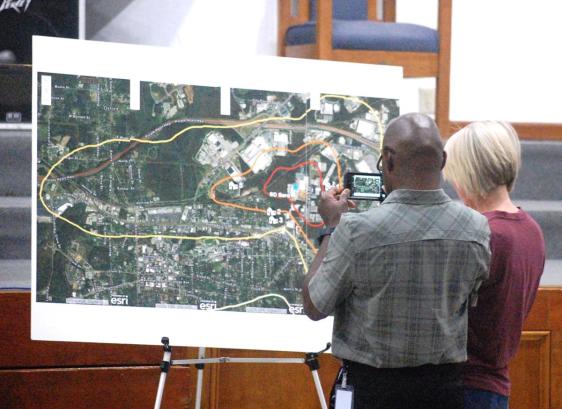
The Covington meeting took place just a few hours after Gov. Brian Kemp’s administration said it was investigating ethylene oxide emissions at the two locations.
Theodosia Wade, a retired biology professor from nearby Oxford College of Emory University, told the gathering that getting more information is vital.
“I don’t think we want to be bashing any of our industry, but I think we ought to hold people accountable. We do need to understand what the data is saying,’’ said Wade, a longtime Covington resident. “I want third-party testing. It can’t come from self-reporting.’’
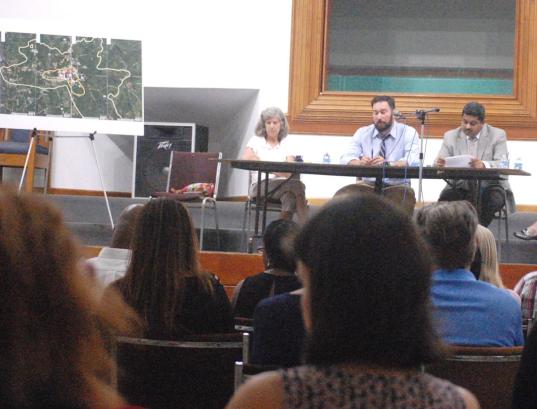
The Covington area has higher average cancer rates than the state, WebMD and Georgia Health News reported last month.
People who live in the 30014 ZIP code are diagnosed with more cancers than residents in Newton County overall and in the state as a whole. In 30014, there were 527 cases of cancer diagnosed for every 100,000 people, compared to an average of 474 cases of cancer diagnosed for every 100,000 people statewide. The difference between the cancer rate in 30014 and the state is statistically significant, meaning that the increase is probably not due to chance alone.
Rates of non-Hodgkin lymphoma, a type of cancer linked to ethylene oxide exposure, have recently been higher in the 30014 ZIP code compared to the Georgia average. Non-Hodgkin lymphoma rates have been rising an average of nearly 7% each year from 2007-2016 in this ZIP code. The increases are statistically significant, according to public health officials.
The state’s Department of Public Health cautions that it is extremely difficult to determine whether an environmental exposure has caused cancer. The agency says its data shouldn’t be construed as a link between any particular environmental exposure and a specific type of cancer.
Speakers at the Covington meeting noted that amounts of ethylene oxide released into the air are reported by companies, such as Sterigenics and BD, and not independently verified.
Geoffroy said, “If we graded our own papers [in school], we’d all get straight A’s.’’
Audience members talked about how cancer has affected themselves or family members.
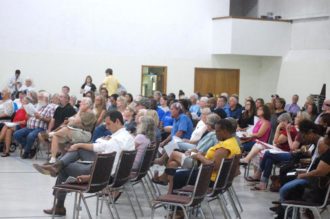
“I’m a survivor of breast cancer,’’ said Carmen Rawls, adding that she was living elsewhere when she developed the disease. ‘‘I’m terrified again’’ of a recurrence, she said.
Velma Slaton talked about how her daughter, Ann Singley, was diagnosed with breast cancer at age 33. Singley lived close to the BD plant. Slaton talked about her own breast cancer as well. “I want to know the answers from somebody,’’ she said to applause.
On Friday morning, state Rep. Pam Dickerson (D-Conyers), whose district covers part of Newton County, called for independent monitoring of ethylene oxide.
“Independent testing of ethylene oxide emissions [in Georgia] is the only reasonable way to guard against the potential cancer caused by this dangerous chemical. I strongly support funding of this testing by the state of Georgia and local governments. We should all work together to understand what we are facing.”

Earlier this week, the city of Covington issued a statement:
“You all may have read an article recently published about the health concerns associated with BD, formerly known as Bard. We just became aware of the article and the allegations against BD. Know that the safety of our citizens is our highest priority. We have briefly spoken with our state representatives, officials from the EPA and BD and are awaiting further detail from them. As more information is gathered, the city will take appropriate action as necessary to protect our citizens.”
The issue is expected to be discussed at a City Council meeting Monday.

